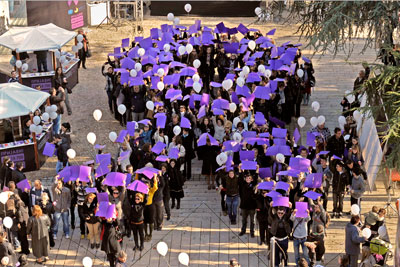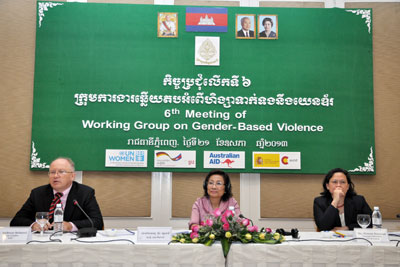Institutional mechanisms for the advancement of women
Specialized institutions can help prevent violence against women. At national, regional and international levels, they have played an important part in informing laws, policies and programmes and advancing gender equality. But more needs to be done on violence against women. According to UN Women research, 125 countries have outlawed domestic violence, but only 52 countries have explicitly criminalized rape within marriage.
We need robust laws and policies coupled with stronger mechanisms to coordinate various actors and ensure effective enforcement and implementation. UN Women works with Governments to develop informed and dedicated national action plans to prevent and address violence against women, strengthening coordination among diverse actors required for sustained and meaningful action. We also partner with Governments, UN agencies, civil society organizations and other institutions to build capacity and increase awareness of the causes and consequences of violence.
We support and advocate for evidence-based policymaking. To this end, UN Women stresses the need for sex-disaggregated data and played an important role in the recent development of nine ground-breaking indicators to measure violence against women. We also work with countries to advance the international normative framework. At the 57th Commission on the Status of Women, Member States adopted far-reaching Agreed Conclusions devoted to Ending Violence against Women. We have also been staunchly advocating the inclusion of a goal with indicators on violence against women in the Post-2015 Development Agenda.
New law spurs action, bringing protection to many
With support from UN Women, The Former Yugoslav Republic of Macedonia adopted a new law against domestic violence in August 2014, which expanded the definition of violence against women and introduced training on gender equality in the formal education system and for civil society service providers. In addition, UN Women successfully supported advocacy efforts to encourage the country to sign onto the Istanbul Convention, the most comprehensive legal framework to address violence against women.
Cambodia takes multi-pronged approach to confronting gender violenceUN Women supported the formulation of Cambodia’s 2nd National Action Plan to Prevent and Respond to Violence against Women through a participatory process informed by research and the voices of survivors. A multi-sectorial Technical Working Group on Gender and Gender-Based Violence consisting of key line ministries, civil society organizations and development partners will now guide its implementation from 2014-2018.
What the Beijing Declaration says about Institutional mechanisms for the advancement of women
Go back to UN Women's In Focus compilation on Ending Violence against Women 2014

